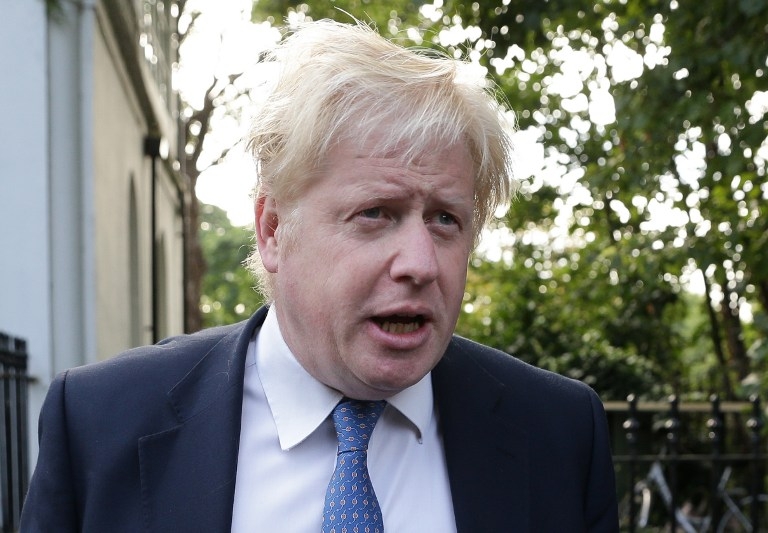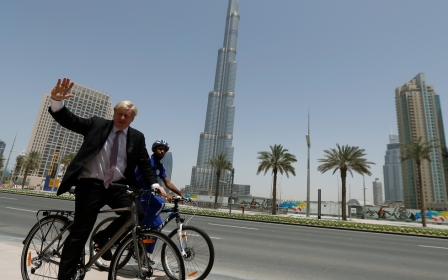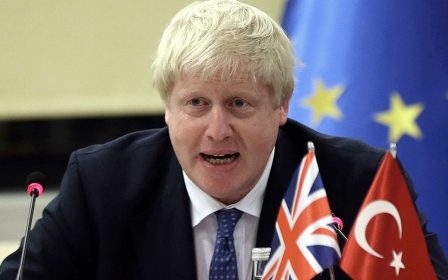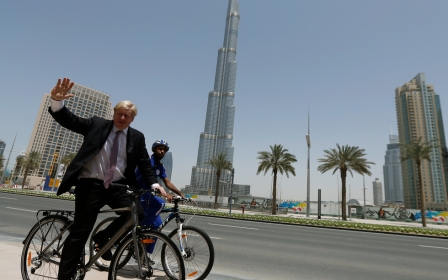EXCLUSIVE VIDEO: Boris Johnson touts underpants sales to Arab world

The British government is set to pursue closer economic ties with Arab states as a consequence of the UK’s looming departure from the European Union, Foreign Secretary Boris Johnson has told ambassadors from the region.
In a speech at a fringe event hosted by the ambassador of Kuwait at last week’s Conservative Party conference, Johnson underplayed concerns about “problems” in the region and suggested that the trade partnership with the Arab world was now one of the UK’s most important business relationships.
“We believe, and I certainly believe, after Brexit in particular, and after our decision to have a new position in the world, that we need to be more outward looking than ever before, more engaged than ever before with the Arab world,” Johnson said.
The British government has pledged to begin negotiations to leave the European Union next year, after a referendum in June this year in which just over 50 percent of voters said they wanted to leave the economic and political bloc.
Middle East Eye has obtained a video of the speech in which Johnson also joked about “selling sand to Saudi Arabia” and exporting British underpants “all over the place”.
He also said that the growth in British exports to the Arab world outstripped equivalent growth in any other part of the world.
But Johnson’s pitch on behalf of British businesses comes amid controversy over UK arms sales to the Saudis, who face accusations of war crimes in Yemen where it is leading an international coalition fighting rebels opposed to the country’s exiled President Abd Rabbuh Mansour Hadi.
British weapons sales to Saudi Arabia are the subject of a judicial review brought about by anti-arms trade campaigners as well as a critical parliamentary select committee inquiry.
Other members of the Gulf Co-operation Council, including Bahrain, the United Arab Emirates and Qatar, with whom the UK has close trade links, are also regularly criticised by human rights groups.
Speaking prior to Johnson, Palestinian Ambassador Manuel Hassassian called on the UK to be more involved in the political process to resolve the conflict between Israel and Palestine, suggesting that Britain has a “historic, legal and moral” responsibility because of the 1917 Balfour Declaration which, he said, had been “the start of the destruction of Palestine”.
But Johnson said he would not “venture to solve the problems of the Middle East peace process off the cuff”.
“It is absolutely vital that we do not allow the Middle East and the Arab world, in the eyes of the British government, to be defined by those problems. This is an area of huge opportunity and this is a relationship that needs to grow,” he said.
READ MORE: Rolls Royce, pants and sand: What Boris Johnson said to the Arab ambassadors
Johnson is not the first British government minister to court Arab markets in the wake of the Brexit vote. In a speech in Dubai in August, Liam Fox, the International Trade Secretary, said that leaving the EU represented an opportunity for the UK and the UAE to “cement our trading future”.
“My message today is simple – that Britain is going to be open for business like never before, and we will use our new-found position outside the EU to become the world’s brightest beacon and champion of open trade,” Fox said.
Meanwhile, Tobias Ellwood, the foreign office minister responsible for the Middle East and North Africa, visited Algeria earlier this month to discuss ways of strengthening "prosperity ties".
Jane Kinninmont, the deputy head of the Middle East and North Africa programme at the Chatham House think tank, told Middle East Eye that the UK’s departure from the EU posed potential economic opportunities for countries such as Tunisia and Morocco, where farmers had been frustrated by EU tariffs which had limited their access to the single market.
“Tunisia and Morocco have large agricultural sectors and also face serious unemployment problems,” Kinninmont said.
“So far, the pattern of British ministerial visits suggest that the Gulf remains the clear priority for trade and defence relations in the Middle East, despite the lower oil price. But strengthening trade co-operation with Morocco and Tunisia would help reinforce stability in North Africa, and would also provide a boost to two of the few countries that have pursued democratic reforms.”
But Allan Hogarth, Amnesty International UK's head of policy and government affairs, said the UK should not prioritise business at the expense of human rights. "We're already worried that, when it comes to economic superpowers such as China, the UK has been deprioritising human rights issues. These comments just add to those concerns," he told MEE.
"Gulf states with deep pockets but poor human rights records shouldn't escape scrutiny, censure and challenge from the UK," he said.
"Saudi Arabia's massive purchases of British arms shouldn't mean that our ministers look the other way over Riyadh's appalling human rights abuses. And restored economic relations with a big power like Iran shouldn't mean the UK lets jailed Britons languish behind bars in Iran.
"Marketing Britain as 'open for business' doesn't necessarily mean human rights will suffer, but that will be the perception unless ministers make it absolutely clear - in words and actions - that Britain will fight for human rights as hard as it fights for the next lucrative trade deal."
Kamel Hawwash, the vice-chair of the Palestine Solidarity Campaign who attended the event, said he had been disappointed by Johnson’s emphasis on trade deals.
"Having heard an impassioned plea from the Palestinian Ambassador for Britain to shoulder its responsibility for the Balfour Declaration [which expressed British support for a Jewish 'national home' in Palestine] and for greater engagement in the peace process, the foreign secretary chose to focus on the importance of trade with the Arab world,” Hawwash told MEE.
“The UK's refusal to press Israel to end its occupation and other illegal acts is also down to its desire to develop stronger trade links with Israel. As far as the UK is concerned trade trumps human rights, it seems.”
Parliament’s human rights joint committee is currently holding an inquiry into the human rights implications of Brexit, including whether it should write human rights requirements into new trade deals, and whether the UK should look to set higher standards than those included in current EU deals.
A Foreign Office spokesperson told MEE: “The Gulf states are important partners for the UK. We work together on a wide range of issues from tackling international security threats to alleviating human suffering – and it is only by working with countries that we are able to bring about the changes we would like to see. The strength of our relationships allows us to talk frankly about difficult issues, and we do not shy away from raising legitimate human rights concerns.”
Last June, the UK's Department for International Trade organised a "Gulf Tour to the UK" in which it promoted business opportunities specifically in Saudi Arabia, the UAE, Kuwait and Qatar.
The UAE is currently the biggest buyer of British imports in the region and the UK's 11th largest trading partner overall, spending $10.3bn in 2015, which amounted to 2.2 percent of all UK exports. Saudi Arabia was 17th on the list ($6.7bn/1.5 percent).
The UK's top trading partners in 2015 were: the US ($66.5bn/14.5 percent), Germany ($46.4bn/10.1 percent), Switzerland ($32.2bn/7 percent), China ($27.4bn/5.9 percent) and France ($27bn/5.9 percent).
Among other British export successes boasted of by Johnson were sales of Rolls-Royce cars in Kuwait. But the cars, while still built in the UK and historically associated with Britain, are now owned by Germany’s BMW which warned staff in the run-up to June’s Brexit vote that jobs could be at risk if the UK left the EU.
Middle East Eye propose une couverture et une analyse indépendantes et incomparables du Moyen-Orient, de l’Afrique du Nord et d’autres régions du monde. Pour en savoir plus sur la reprise de ce contenu et les frais qui s’appliquent, veuillez remplir ce formulaire [en anglais]. Pour en savoir plus sur MEE, cliquez ici [en anglais].




